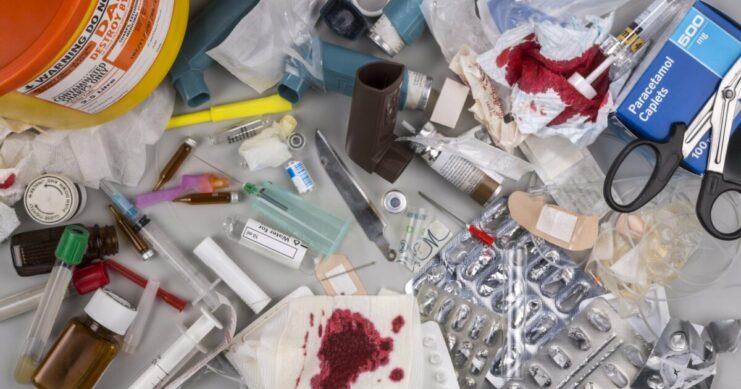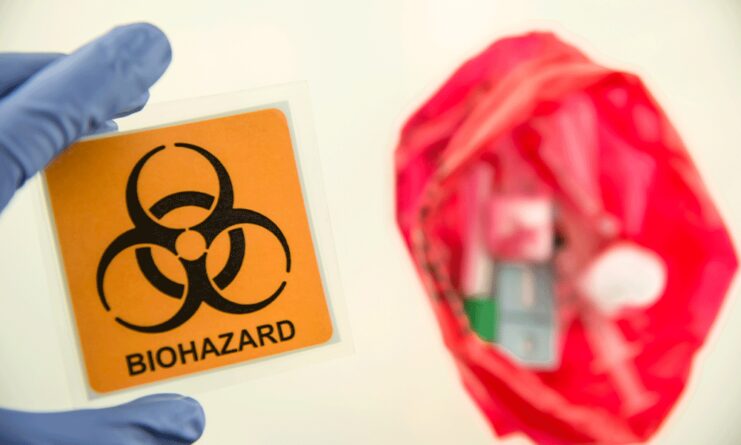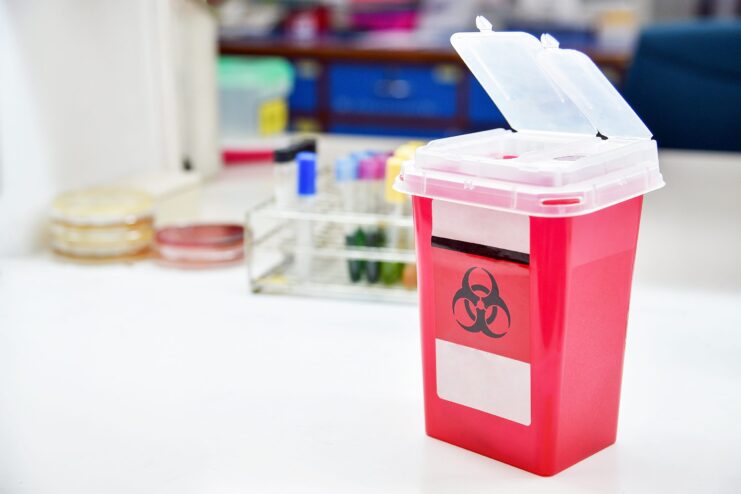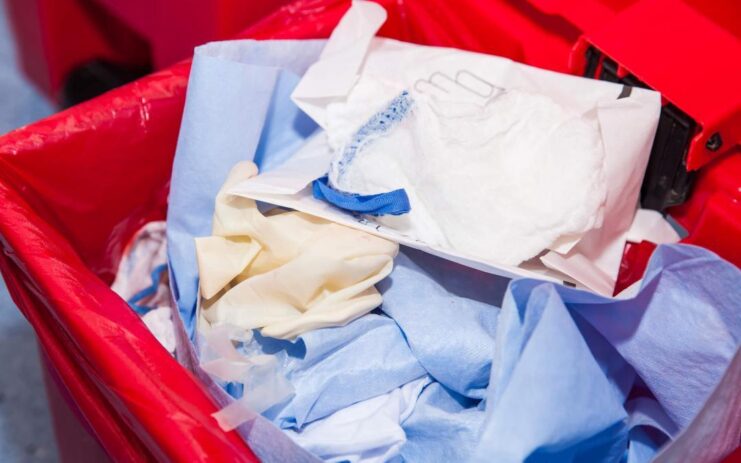Did you know that improper medical waste management can present serious health risks to you and your family?
As a healthcare provider, it is your responsibility to ensure that all of your medical waste is properly handled and disposed of. In this article, you will learn the hidden health risks associated with poor medical waste disposal and how you can ensure that these risks don’t become reality.
Types of Medical Waste
Medical waste is any waste material generated from healthcare activities that pose a risk of infection to humans or the environment. It can include items such as needles and other sharps, laboratory specimens, biopsy products, and cultures, as well as materials used for patient care such as bandages, gloves, and disposable gowns.
This type of waste needs to be managed safely and responsibly to reduce health risks. Proper medical waste management techniques can reduce the spread of communicable diseases while protecting the environment.

The types can generally be classified into three main categories: infectious, hazardous, and non-hazardous materials.
- Infectious wastes are those contaminated with bodily fluids or microorganisms likely to cause infection in humans when handled. Examples include blood, excreta, tissues, organ cultures, and surgical items like sponges worn during operations.
- Hazardous wastes are substances that may pose harm to human health or the environment if not handled correctly. These include chemicals used for treatments such as disinfectants and pharmaceuticals.
- Non-hazardous materials are items like paper towels or packaging from medical supplies which do not present any potential risk when discarded properly.
The Dangers of Improper Medical Waste Management
In the United States, the rules and regulations surrounding proper medical waste disposal are both state and EPA governed, but due to improper education or inadequate training, many still do not understand the risks associated with not following a proper management protocol.
Common consequences of poor management practices include contamination of public areas due to improper disposal methods; improper treatment of infectious materials leading to disease spread; hazardous exposures that can harm sanitation workers, patients, visitors, and staff; as well as costly fines from governmental agencies for non-conforming practices.
The health risks associated with improper medical waste management are far-reaching and serious. If untreated or handled correctly, biohazards such as sharps or treatment areas that have come into contact with body fluids can carry any number of contagious illnesses resulting in outbreaks in residential areas or healthcare facilities.

Additionally, infectious materials can also contaminate our water supplies through water runoff if they are improperly disposed of in dumpsters or landfills that eventually make their way into natural waterways. Proper protocols must be put in place on an individual facility level as well as across the entire industry if we hope to mitigate these dangers.
Health Risks from Improper Medical Waste Management
Improper management of medical waste can have serious, long-term health consequences for exposed individuals and the environment. Unprocessed drug residues and infectious material can potentially spread a variety of contagious diseases and put individuals at risk for infection. Improperly disposed of medical waste may contain heavy metals, hazardous materials, and radioactive isotopes that are toxic to both humans and animals if not correctly handled.
Improper disposals, such as burning or burial in open areas that are accessible to children or nearby wildlife, can further exacerbate human health risks by releasing air pollutants in the form of fine particulate matter or noxious fumes. This pollution has been linked to respiratory problems such as asthma as well varying types of cancer at extremely high levels of exposure. Additionally, heavy metals can also accumulate in food sources which could lead to food poisoning or other related illnesses if consumed over an extended period.
To protect the public welfare and reduce the spread of disease-causing agents, due diligence is needed from healthcare providers to correctly handle their medical waste with appropriate steps being taken for segregation, storing, packaging, and safe disposal through approved methods such as autoclaving. By taking these proactive measures early on, it is possible to reduce health risks associated with inadequate handling and disposal known throughout numerous scenarios associated with improper medical waste management practices.
Solutions for Proper Medical Waste Management
To ensure that medical waste is managed in a safe, effective manner, it is essential to recognize and implement the necessary safety protocols. Healthcare providers need to take full responsibility for their medical waste management program and conform to all state, federal, and industry regulations.
The following steps can help ensure compliance with industry standards:
- Education – employees should receive training on the proper handling, storage, and disposal of hazardous materials. This includes educational materials on the potential health risks of improper disposal methods.
- Proper procedures – healthcare facilities should develop standardized waste management procedures for their environment, such as segregated collection areas for biohazardous materials and other yellow bag items. These procedures should be communicated to all staff members.
- Use of personal protective equipment (PPE) – healthcare workers should wear proper PPE when handling contaminated waste or hazardous chemicals. This includes gloves, masks, sneeze guards, and gowns as needed by the specific situation. PPEs can help protect workers from potential exposure to harmful materials.
- Automated systems – automated collecting systems can greatly reduce the time and effort needed for manual sorting tasks; this reduces the risk of contamination or improper disposal by removing human error from the equation.
- Regular monitoring – healthcare facilities should regularly inspect their processes and practices; this helps ensure that all wastes are properly separated into different categories so that correct disposal options like recycling/reusing items are available if needed. Additionally, regular inspections help maintain compliance with state/federal guidelines regarding the proper treatment of hazardous materials before final disposal.
Conclusion

In conclusion, improper medical waste management carries many hidden health risks for those who are exposed. Healthcare workers and other individuals are at risk of possible infection from exposure to infectious medical waste. The risk increases if the medical waste is not properly identified, collected, and handled.

